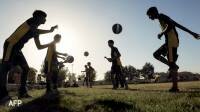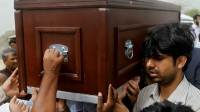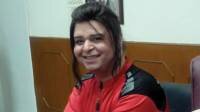Riffy Khan is back from a 10-day trip to rural Sindh. There, with a bunch of her friends from the transgender community, she lead demonstrations, held protests and campaigned to get accepted in mainstream society.
Riffy is general secretary of the Gender Interactive Alliance, a not-for-profit organization fighting for the rights of transgender.
She was born a boy. But as she made it to sixth grade in school, she felt like she did not belong in her body. Soon she was stealing the red lipstick her sister carried and applying it on her puckered lips. Imitating her mother, sometimes she would drape a dupatta on her shoulders.
“It is a confusing phase. Not knowing where to go. No one understands you,” said Riffy. Her transformation is complete. Today, Riffy is at ease with her long hair and carefully applied pink lipstick.
But she wants the society to understand people like her. “Very few transgender are born with deformed sexual organs – maybe one in 1000. It is more of a hormonal problem. You feel like you don’t fit in your body.”
When a family first realizes that their son has begun to act like a girl, they scold or beat him up and force him to stop being himself (herself). “But the soul doesn’t find peace. Eventually these young boys run away and settle in transgender communities present all over the country. There they get freedom to express themselves.”
But this ghettoization brings with it problems. “They never get accepted in the mainstream. No one gives them admissions in educational institutions. They don’t get jobs and so most live off the streets.”
Perhaps it was this very feeling that made Riffy and a bunch of like-minded members of the transgender community to campaign to get accepted in the public space. It started with demanding a separate identity.
In 2011, after massive campaigning by transgender across the country, the Supreme Court ruled that the transgender or Khwajasera were a third gender in the country.
On their national identity cards they could mention their newly-recognized sex.
This gave newfound independence. The transgender could now vote. Moreover, they could go on to become parliamentarians. During the elections last year, vocal campaigns were run by two members of the community-- Bindiya Rana and Sanam Fakir who contested as independent candidates.
In 2012, another court ruling came forward. Transgenders were to be equal citizens, receive the right to inheritance and enjoy free health care and education. They could also adopt any profession they wanted.
As goodwill gesture the cantonment board employed 17 transgenders as tax recovery officers in the revenue department.
These were landmark victories for a community which mostly occupied the lowest rung of the occupational ladder. They were finally getting accepted. But last month, a television show on a private channel dampened the spirit of the entire campaign.
On live television a reporter barged into the house of a transgender with the area police. She caught on tape a man who was allegedly having illicit relations with the transgender. The reporter rummaged the house and found empty packets of condoms. She demanded that the transgender accompany her to the police station as she was actually a man posing as a she-male.
There was uproar by the transgender community across the city at the audacity of the reporter who had invaded private space. “She brought bad name to the entire community. We were fighting off exactly this image that all transgender sell sex for a living,” said Bindiya Rana, a GIA founding member.
After the episode of the television show went viral on the social media, members of the community had to face serious consequences. “I received young girls (transgender) at my house who had been evicted by their landlords for they suspected they were into prostitution,” said Mazhar Anjum, vice-president GIA.
To counter the damage a massive campaign began in the city. For a whole week visits to government offices, human rights organizations and political leaders were made. Journalists were rounded up and protests held at the Karachi Press Club.
“Transgender are equal citizens,” and “Article 14 of the Constitution states that privacy of the home cannot be violated,” stated some of the placards they carried with them during the demonstration.
When they visited the Karachi office of the Human Rights Commission Pakistan, civil society empathized with them. “Transgender are marginalized and vulnerable. They should have equal opportunities in society. Just because they look or dress different they should not be ridiculed,” said Syed Shamsuddin, who heads the Sindh chapter of the rights group.
They visited the city commissioner and minister of the Social Welfare Department, Rubina Qaimkhani.
Here three transgender were given appointment letters for jobs in the department.
Riffy who has a Master’s in political science, got a job as an office assistant. The other received jobs as social workers in the department.
Qaimkhani also promised to speed up the process of constructing vocational centres for transgender throughout Sindh. “Transgender should have all the opportunities to progress. They should become contributing members of the society.”
To help the community learn skills four vocational centres have been planned at Khairpur, Sukkur, Hyderabad and Karachi. The one in Karachi is already operational.
Things are moving in the right direction, but it will be years before the community is accepted by the mainstream. “You see even women are struggling to get accepted in the public space. Our movement towards emancipation has just started,” said Riffy.
According to informed estimates, there are 70,000 transgender in Sindh.
The witer is a journalist based in Karachi.

























